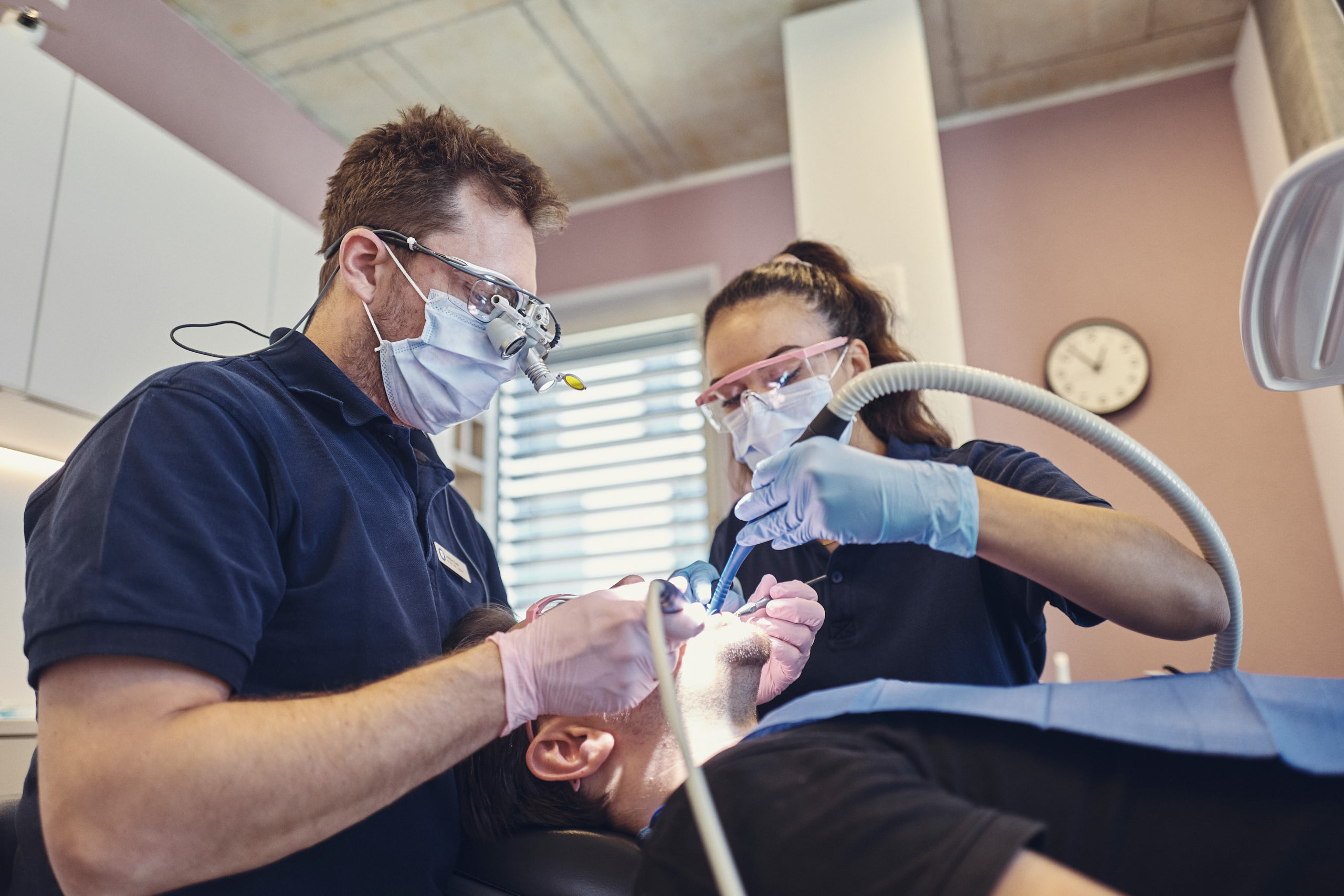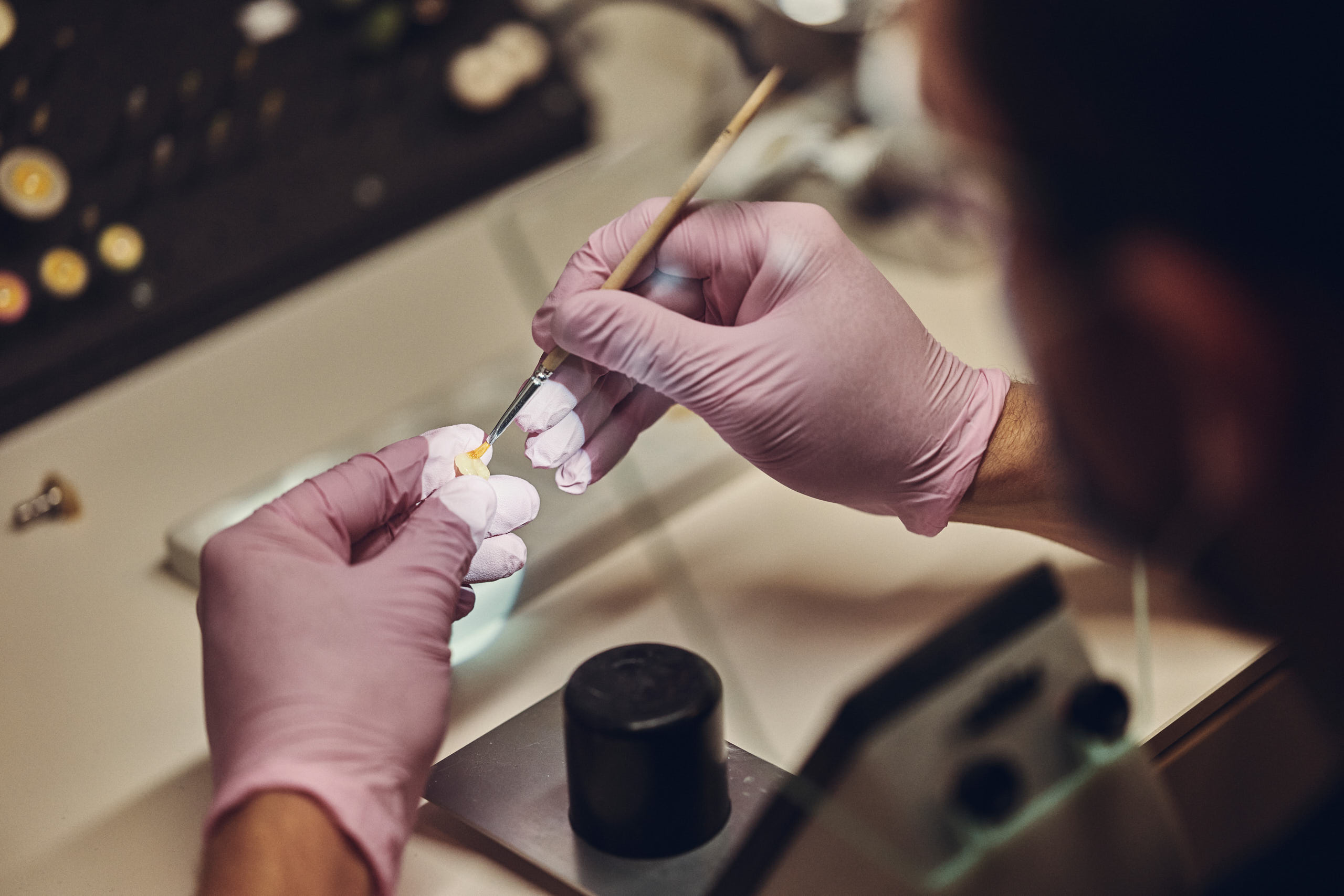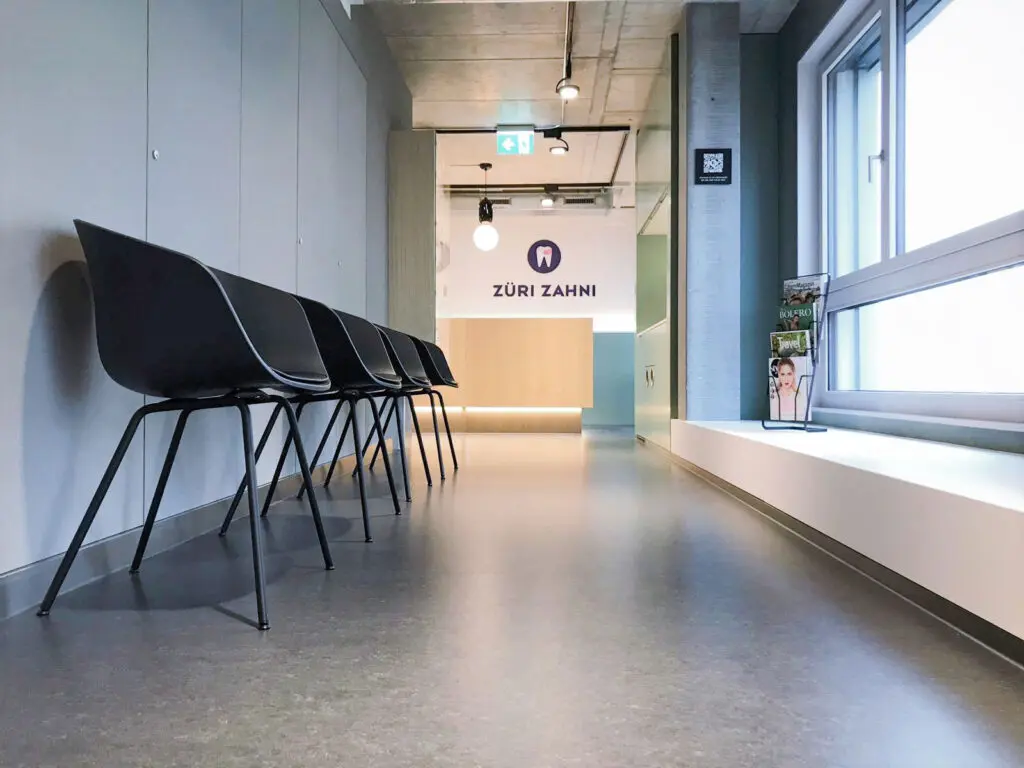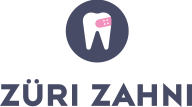Gum disease and periodontics
What is Periodontitis?
With a prevalence of around 40%, periodontitis is one of the most common gum diseases worldwide. This bacterial infection affects the gums, periodontal ligaments, and jawbone, leading to tissue loss, gum recession, and eventually tooth loss if left untreated. Typical symptoms include severe inflammation and pus formation. Early diagnosis and treatment are essential for maintaining long-term oral health.
At Züri Zahni, our experienced team of experts is here to support you comprehensively in preventing and treating periodontitis in Zurich.
Why Choose Periodontics at Züri Zahni in Glattpark?
Individualized Care and Modern Treatment Methods
Our periodontist develops a personalized treatment strategy for you, based on scientifically proven therapy concepts and supported by the latest technology. All of this is designed to improve and promote your gum health.
Comprehensive and Regenerative Periodontitis Treatments
We offer both conservative (non-surgical) and open (surgical) treatments for periodontitis. When indicated, regenerative methods are used in combination on top. To enhance aesthetics and function of the gums, we propose different types of soft tissue surgeries and grafting procedures.
Focus on Prevention and Stability
Through preventive measures, regular check-ups, and dental hygiene appointments, we help you effectively prevent inflammation/infection of your gums and relapse of periodontitis, supporting you in maintaining stable oral health.
Interview with Delia Irani
We Offer the Full Range of Periodontal Services

Professional Dental Hygiene and Comprehensive Periodontitis Therapies
We provide regular cleanings, check-ups, and traditional periodontitis treatments—both non-surgical and surgical—to support and enhance the health of your gums.

Recession Coverage, Gum Surgeries, and Bone Augmentation
Our procedures for soft tissue surgeries or covering exposed tooth roots help restore the aesthetics and function of your gums. Before implant placement, it may be necessary to augment the gum and/or the bone to ensure a successful procedure and a long-lasting result.

Implants and Peri-Implantitis Treatment
In addition to offering high-quality implant solutions for replacing lost teeth or supporting removable dentures, we also provide targeted treatments for infected implants and peri-implantitis.
WHAT OUR CUSTOMERS SAY ABOUT US

CONSULT OUR EXPERTS
My name is Delia Irani, and I am responsible for the periodontics and implantology at Züri Zahni. Together with our dental hygiene specialists, we are well-equipped to offer you a variety of treatment options for your gums and supporting dental structures.
Our personalized therapies in periodontics are based on scientifically backed, clinically proven methods, using the latest technology and focusing on long-term care and careful follow-up. To keep your oral health stable over time, we provide regular check-ups and hygiene appointments to detect and manage recurrences early on with targeted oral hygiene support.
Schedule a consultation with us today—we’ll gladly answer your questions and inform you about the treatment options available at Züri Zahni.
Questions & answers
Periodontitis is one of the most common diseases worldwide, affecting about 40% of the population. It is a bacterial infection that affects the gums, periodontal apparatus, and bone, leading to their breakdown. If untreated, it results in severe inflammation, pus formation, and ultimately tooth loss.
Various risk factors contribute to periodontitis. The main ones include poor oral hygiene, lack of regular dental hygiene appointments, smoking, and systemic diseases like uncontrolled diabetes. Genetic factors also play a role; a family history of periodontitis can increase the risk.
There are few studies on other forms of nicotine and/or tobacco consumption. E-cigarettes contain various chemicals that may be harmful to the gums and periodontal tissue. Additionally, the dry mouth caused by vaping could encourage bacterial growth, increasing the risk of periodontitis and cavities.
Periodontitis can be exacerbated or triggered by hormonal changes. It is advisable to rule out or treat periodontitis before or during pregnancy, as inflammation can negatively impact the baby’s birth weight and may be a risk factor for premature birth.
Treating periodontitis is a team effort involving your dentist, dental hygienist, and yourself. It’s essential to improve your oral hygiene, especially in between teeth, reduce or quit smoking, and, if necessary, consult your general practitioner about any underlying conditions like diabetes.
Periodontitis is diagnosed using clinical and radiological findings. This includes X-rays, detailed measurements, and photos. Additional tests, such as cold tests to evaluate nerves and plaque tests to assess oral hygiene, may be used. Sometimes, the IAI Padotest is used to identify the bacterial biome in the pockets.
1. Improving Oral Hygiene:
After diagnosis and treatment planning, we first support you in enhancing your oral hygiene. If needed, coordination with your general practitioner may be arranged, and smoking cessation support discussed.
2. Non-surgical Therapy:
In the second step, your gums are deeply cleaned using local anesthesia. This “non-surgical therapy” usually takes 2-4 hours, spread over 1 to 4 sessions. Additional steps may include removing non-restorable teeth, treating cavities, or root canal treatments. Three months after the deep cleaning, we will reassess the situation.
3. Surgical Therapy:
Any remaining pockets are reevaluated, and if necessary, “surgical therapy” is performed. This includes deep cleaning under visual guidance, removing inflamed tissue, and filling defects with supportive materials. These procedures generally take 1.5 to 2.5 hours per region.
4. Maintenance Phase:
In this final step, the condition is kept stable with regular dental hygiene and check-ups. The frequency of these appointments is customized based on your oral hygiene, residual periodontal issues, smoking habits, and individual needs.
Additionally, we use soft or diode lasers as supportive measures and prescribe antibiotics if needed to aid healing and reduce bacteria.
After treatment, your previously swollen, bleeding, and reddened gums will heal, which may result in gum shrinkage, making your teeth appear longer. Spaces may form between teeth, trapping food particles. Teeth may also become more sensitive to cold, and previously connected teeth may feel looser.
Tissue loss will continue until pockets and bacteria reach the tooth roots. At this stage, the tooth nerve may become infected, causing pain and pus, or the tooth may fall out. Additionally, bacteria can spread in the mouth, affecting other teeth. Periodontitis also negatively impacts overall health, such as diabetes and cardiovascular diseases.
If residual problems like deep pockets remain after “non-surgical therapy,” surgical therapy is recommended to achieve periodontal stability. Success depends heavily on your oral hygiene, general health, and smoking habits.
Once periodontitis develops, it remains a lifelong condition. The goal is to achieve stability so that no further tissue loss occurs. This requires your cooperation, regular dental hygiene appointments, and dental check-ups.
Depending on the extent and severity of periodontitis, initial diagnosis and non-surgical therapy cost between 3,000 and 4,000 CHF. A detailed cost estimate will be provided at the beginning of treatment. Surgical interventions cost between 600 and 1,000 CHF per region. The non-surgical phase, where natural self-healing powers are leveraged, typically takes about 6 months. Afterward, surgical therapy or the maintenance phase with regular dental hygiene sessions begins.
Periodontitis bacteria can be mildly transmitted between individuals. However, for someone with an established microbiome and good oral hygiene, transmission is unlikely. In babies or young children, whose oral cavity contains few bacteria, avoiding transmission (e.g., through pacifiers, cutlery, or drinking cups) is essential.
Yes, a positive family history can increase the risk of developing periodontitis. Genetic factors play a significant role in susceptibility. If your parents have periodontitis, practicing good oral hygiene and having regular dental check-ups is crucial to ensure early diagnosis and treatment.
For more information, visit the official website of the Swiss Society of Periodontology: www.parodontologie.ch.










